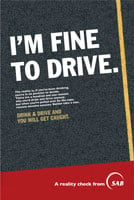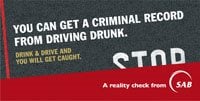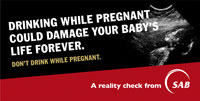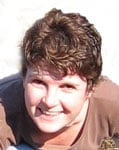South African Breweries (SAB) recently launched a bold advertising campaign to counter prevailing alcohol abuse amongst South African drinkers. The campaign is part of a multifaceted initiative to combat alcohol abuse in South Africa.
Targeted at drivers and mothers-to-be, the R50 million 'Reality Check' campaign is the largest investment to date by the SAB in raising awareness about the negative consequences of irresponsible drinking.
Complementary campaign
Intended to be a complementary campaign to other external and internal programmes, both from SAB and other companies and strategic stakeholders (such as law enforcement agencies and Government), the campaign aims to educate drinkers on the personal and societal consequences of drinking while pregnant, and driving under the influence.
"SAB is committed to addressing drink driving and foetal alcohol syndrome (FAS) proactively and pragmatically. This campaign challenges some of the myths, as well as excuses, used to justify the irresponsible drinking and driving, and the unacceptably high prevalence of FAS in some parts of the country," points out Vincent Maphai, director of corporate affairs and transformation at SAB.
"We want to change mindsets and ensure that more South Africans understand the added personal responsibilities that come with consuming alcohol."
Created primarily as a national public education campaign, 'Reality Check' presents a range of scenarios and perceptions, each offering a 'reality check' on the ramifications of various inconsiderate and short-sighted views and activities associated with irresponsible alcohol consumption.
No-nonsense text
Some of the headers include the likes of “I'll just pay the bribe” and “I'm fine to drive”, followed up with no-nonsense text such as: “Everyone complains about South Africa's corrupt cops. Nobody complains about the spoilt South Africans who pay the bribes. You drink and drive because you think you can get away with it. The reality is things are changing. Cash passed between hands isn't always going to save you. A drinking and driving offence is bad enough. Would you like to be charged with corruption too? Drink and drive and you will get caught.”
"Not to be considered in isolation, this series of ads is a serious wake-up call that we hope will prompt changes in attitudes and behaviours among South African drinkers, supported by their family, friends and colleagues," adds Maphai.
Public engagement points for the campaign will include washrooms, campuses, carwashes, buses and other high traffic outdoor areas. In addition, the campaign will be presented in mass reach media such as newspapers, radio, magazines and billboards.
"The campaign is very matter of fact and to-the-point about the potential impact on your life and the lives of others, including an unborn child," explains Suhana Gordhan, creative director at Black River FC, the agency responsible for the development of the 'Reality Check' campaign. "Rather than using metaphors and graphic imagery, the ads are pared down, challenging anti-social attitudes and misplaced notions with direct and simple messages."
"SAB is really putting its money where its mouth is with this campaign," concludes Gordhan. "In terms of media value, 'Reality Check' is among the top-three of SAB's brands. As an agency, we can hardly look for better commitment."
Does preventive advertising work?
However, the launch of campaigns of this nature inevitably leads to the same question - does preventive advertising work; will a poster in a restroom stop a drunk consumer from getting behind his wheel, or prevent a pregnant woman from transferring her alcohol addiction to her unborn child?
“If this campaign was the only action that we were taking against the irresponsible consumption of alcohol, I would be the harshest critic of all,” says Maphai, who is spearheading the campaign.
“When you're dealing with any issue of national importance, there must be several layers of attack - awareness is just one of the layers,” he says.
Campaign not the whole story
In fact, whenever anyone from SAB speaks about this campaign, they are at pains to point out that it is only “part of a multi-faceted initiative to combat alcohol abuse in South Africa.”
The launch of the campaign follows hot on the heels of an announcement by SAB that it was significantly stepping up its anti-abuse and responsible consumption activities nationwide. In addition to the R50 million spent on the campaign, the country's largest brewery has also just announced a R4 million investment in on-the-ground activities that will play an active role in improving police capabilities in arresting and prosecuting drivers under the influence.

One of the campaign's major aims is to change drivers' attitudes by impressing upon them the consequences of being caught DUI, and being prosecuted.
click to enlargeOn Tuesday, 21 October 2009, SAB and the KwaZulu-Natal Department of Transport Road Traffic Inspectorate unveiled the country's first state-of-the-art Alcohol Evidence Centre (AEC) in Pietermaritzburg. The AEC is outfitted with the latest equipment to accurately detect a driver's blood alcohol level through a single breath sample, as well as a closed-circuit television network to monitor the testing process.
The centre and others like it that will soon be launched across the country are expected to dramatically improve prosecution rates of those arrested for driving under the influence.
"Research has shown that effective enforcement and prosecution are the most effective ways to change attitudes and behaviours among those who drink and drive," says Maphai. “We obviously can't enforce ourselves, but by equipping police with tools to better arrest and prosecute irresponsible drivers, we are enabling the process."
The campaign also ensures that South Africans know that their actions will have severe consequences.
Future initiatives in the wings
The other societal problem area addressed by the campaign - that of the unacceptably high levels of foetal alcohol syndrome recorded in some areas of the country - will also be supported by a series of prevention and education initiatives to be announced as part of a comprehensive partnership with a South African-based NGO.

Outdoor: the campaign ensures that South Africans know that their actions will have severe consequences.
click to enlargeAnd, says Maphai, in these specific geographic locations SAB has taken the decision to remove all alcohol brand advertising and replace it with the ‘Reality Check' campaign.

An outdoor ad focusing on foetal alcohol syndrome (FAS).
click to enlargeFuture on-the-ground initiatives involve outlet education that aim to instil a sense of responsibility in those who sell alcohol, to not provide drinks to pregnant or inebriated customers.
In addition, Maphai comments that SAB is also investigating the concept of ‘the designated driver', which will see the company partner with bars and nightclubs to sponsor soft drinks for a party's designated driver.
“We have a budget; we just need the support from the outlets,” he says.
In conclusion, Maphai comments that the campaign should not be viewed as SAB's solution to the national culture of irresponsible alcohol consumption - just one small part of it.

Outdoor: the unacceptably high levels of FAS in some parts of the country will be supported by a series of prevention and education initiatives.
click to enlarge“But we cannot do nothing until we have the perfect answer; we have to start somewhere. And awareness is exceptionally important.
“Let's not forget that, as marketers, we believe that advertising has the power to shift consumer attitudes and ultimately change behaviour. If we believe that SAB's advertising of Castle Lager prompts consumers to buy the brand, we must believe that its communication of the perils of irresponsible drinking will - at least some of the time - persuade them to desist,” he says.
Radio ads










































